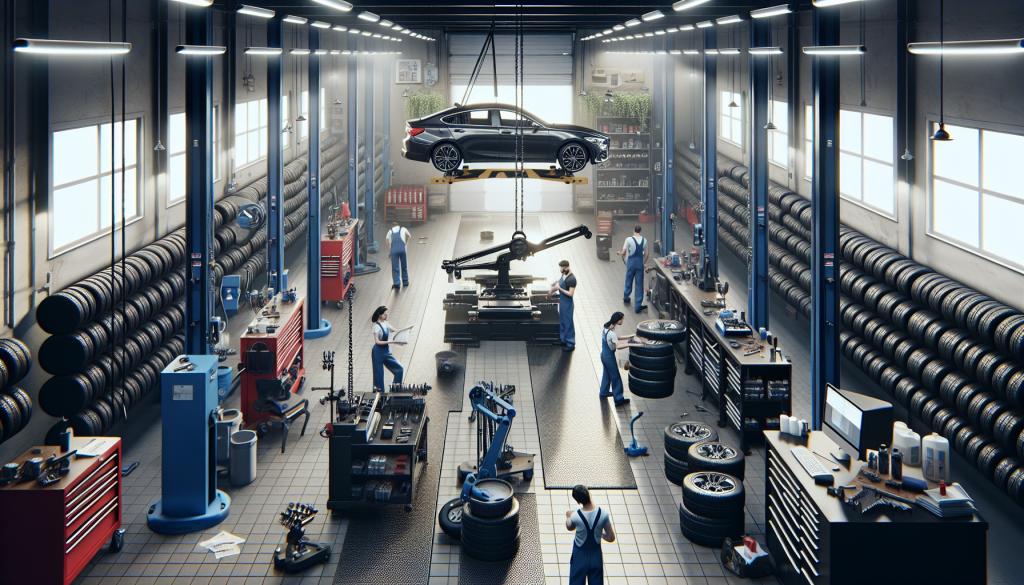Why Suspension Alignment Matters
What’s Up with Wheel Alignment?
Keeping your wheels in line is a big deal for how your car drives and how long your tires last. When your wheels are out of whack, it messes with your ride and can even be dangerous. Here are some common issues you might face:
- Tires Wearing Out Funny: If your wheels aren’t lined up right, your tires will wear unevenly, meaning you’ll have to replace them sooner.
- Steering Problems: Your car might pull to one side, making it hard to drive straight.
- Shaky Steering Wheel: Misaligned wheels can cause vibrations, especially when you’re going fast.
- Wasting Gas: Proper alignment helps your tires roll smoothly, which saves fuel.
| Problem | Symptoms |
|---|---|
| Tires Wearing Out Funny | Tread wear on one side more than the other |
| Steering Problems | Car pulling to one side |
| Shaky Steering Wheel | Steering wheel shakes |
| Wasting Gas | Increased fuel consumption |
Fixing Your Ride
Getting your car back in shape means tackling the alignment issues head-on. Here’s how you can do it:
- Regular Check-Ups: Keep an eye on your alignment regularly to catch small problems before they become big headaches. Follow a maintenance schedule to keep things running smoothly. Check out our suspension system maintenance guide for more tips.
- Precision Tools: Using high-precision tools ensures your alignment is spot on. Learn more about these tools in our article on suspension alignment tools.
- Adjusting Angles: Getting the camber, caster, and toe angles right is key. Each angle affects how your car handles and how your tires wear. Dive into our guides on adjusting camber, adjusting caster, and adjusting toe.
- Road Test: After making adjustments, take your car for a spin to make sure everything feels right.
- New Tires, New Alignment: Always align new tires to avoid uneven wear and make them last longer. Learn more in our suspension alignment service.
- Tech Training: Make sure your mechanic knows their stuff and is up-to-date with the latest gear. Find out more in our suspension alignment training.
- Educate Yourself: Knowing why alignment matters helps you stay on top of maintenance. Check out our suspension alignment guide for more info.
- Seasonal Tweaks: Changes in weather can mess with your alignment, so adjust it periodically. Read more in our article on seasonal suspension alignment adjustments.
- Watch Your Tires: Keep an eye on how your tires are wearing to catch alignment issues early. See more at monitoring tire wear patterns.
- Fix Suspension Problems: Sometimes, alignment issues are due to bigger suspension problems. Get the lowdown on fixing these in correcting suspension issues.
By staying on top of your wheel alignment, you can make sure your car drives smoothly and safely.
Picking the Best Suspension Alignment Shop
Keeping your car in top shape means finding the right suspension alignment shop. Here’s what you need to know to make a smart choice.
Regular Check-Ups
A good shop should offer regular check-ups. These help catch alignment problems early, saving your suspension from more damage. Regular inspections also extend tire life and improve how your car handles. Curious about keeping your suspension in shape? Check out our article on suspension system maintenance.
Top-Notch Tools
The shop should use high-quality tools for accurate alignment. Modern equipment ensures precise adjustments, which are key for your car’s performance. Want to know more about the tools used? Visit our page on suspension alignment tools.
Adjusting Camber, Caster, and Toe
Getting camber, caster, and toe angles right is crucial for smooth driving and long-lasting tires. Here’s a quick rundown:
| Part | What It Does |
|---|---|
| Camber | Wheel angle relative to the vertical axis |
| Caster | Steering pivot angle relative to the vertical axis |
| Toe | Direction wheels point relative to each other |
For more details, see our articles on adjusting camber, adjusting caster, and adjusting toe.
Test Drive After Alignment
A road test after alignment is a must. The tech should take your car for a spin to make sure it drives straight and handles well. This confirms the alignment is spot-on.
New Tires, New Alignment
New tires often need an alignment check to ensure they wear evenly and give a smooth ride. A good shop will include this service, helping your new tires last longer. For more info, read our article on suspension alignment for new tires.
Techs Who Know Their Stuff
Technicians should be up-to-date on the latest tools and techniques. Ongoing training keeps them sharp and ensures they’re using the best methods. Learn more about suspension alignment training.
Educating Customers
A quality shop will explain why alignment matters. They’ll tell you how it affects safety, handling, and tire wear, helping you make informed decisions. Read more on alignment importance.
Seasonal Adjustments
Road conditions change with the seasons, and so should your alignment. A good shop offers seasonal adjustments to keep your car performing well year-round. Learn more about seasonal alignment adjustments.
Watching Tire Wear
Keeping an eye on tire wear can reveal alignment issues. A good shop will check your tires regularly and make adjustments to prevent uneven wear. For more details, visit our article on monitoring tire wear patterns.
Fixing Suspension Problems
The shop should be able to diagnose and fix suspension issues. Proper alignment often means addressing underlying problems for a complete fix. For more on this, see our article on correcting suspension issues.
By keeping these points in mind, you can find a suspension alignment shop that keeps your car running smoothly and safely. For more tips, explore our guide on suspension alignment.


